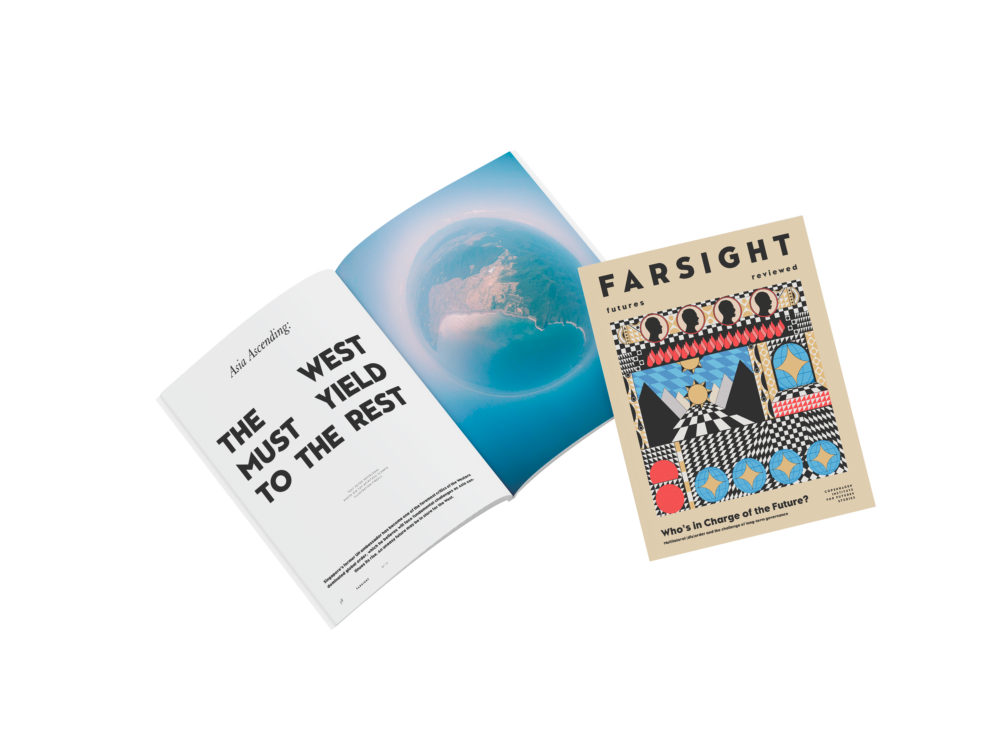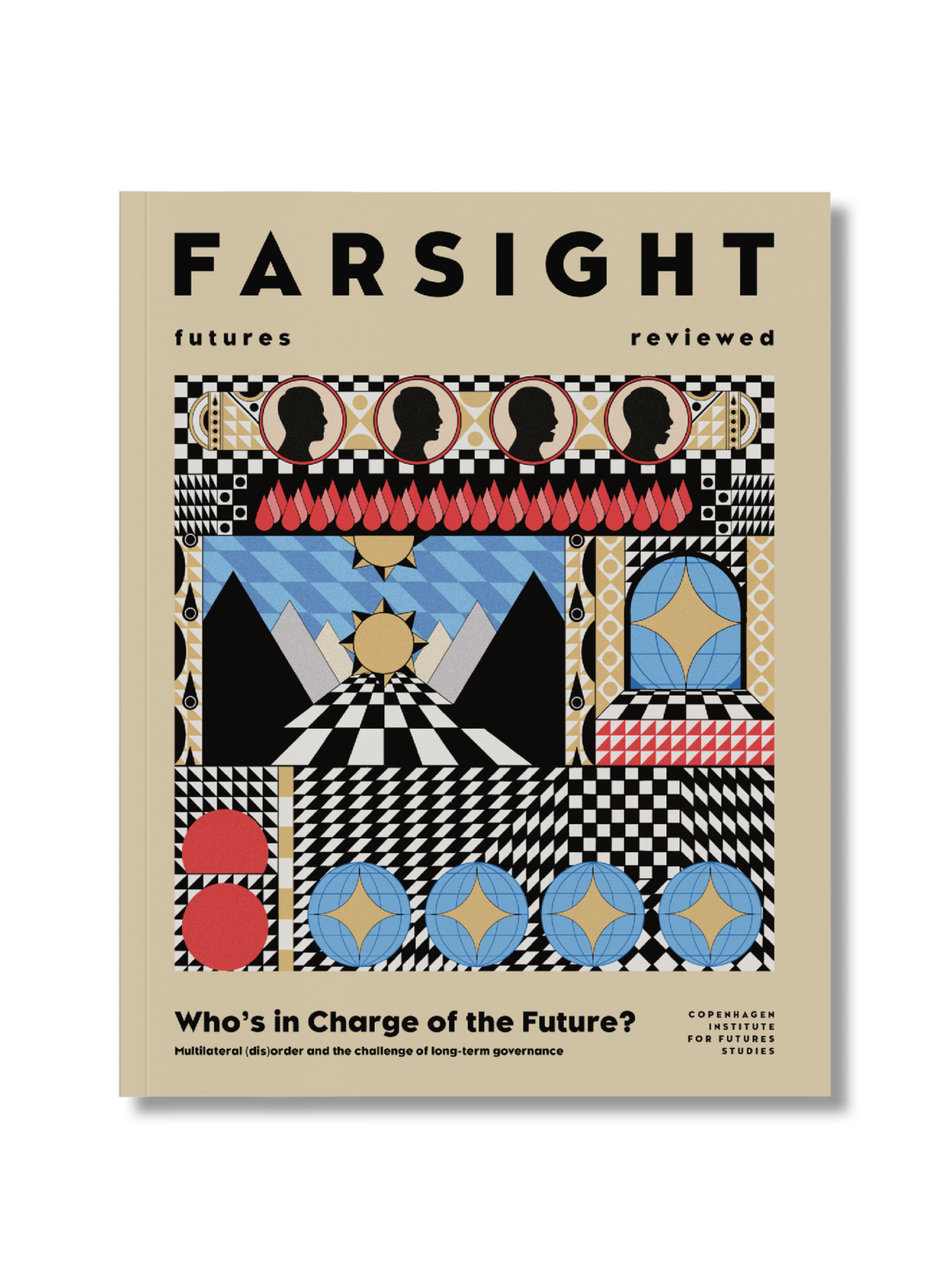
In turn, we use cookies to measure and obtain statistical data about the navigation of the users. You can configure and accept the use of the cookies, and modify your consent options, at any time.

Singapore’s former UN ambassador Kishore Mahbubani has become one of the foremost critics of the Western-dominated global order. The West will need to learn humility in a more pluralistic future, he argues.
Image: Adobe Firefly
This article was originally published by MandagMorgen.
It has been translated and edited for use in FARSIGHT.
In the West you don’t understand why the rest of the world doesn’t think like you do. For us, it’s shocking that you assume your values to be absolute and everybody must come to obey them – believing you are the normal, and everyone else are the abnormal.”
Kishore Mahbubani doesn’t shy away from expressing himself in clear and provocative terms. Having served as Singapore’s ambassador to the UN for ten years and as President of the UN Security Council from 2001 to 2002, he is well-acquainted with Western values. Yet he has become one of the most outspoken proponents of the view that Asia will become the global centre of economic and political power. The West, along with its culture and values, is in decline, soon to be eclipsed by Asia.

Broaden your horizons with a Futures Membership. Stay updated on key trends and developments through receiving quarterly issues of FARSIGHT, live Futures Seminars with futurists, training, and discounts on our courses.
become a futures memberAnd it will change the tone of the conversation between the West and ‘the rest’, Mahbubani says:
“The Western countries make up only 12 percent of the world’s population. You don’t notice your own arrogance but it’s the first thing the world’s 88 percent see in the West. You show no humility at all when you talk about your values.”
During the last 40 years, Kishore Mahbubani has described this great shift from West to East in a series of books and essays with titles like The West and the Rest, Has the West Lost It?, and Can Asians Think?. He regularly offers commentary to media outlets like the Financial Times and various US TV networks.
“The West has been dominating the world for 200 years. But that was an aberration, and it is coming to an end now. The rest of the world has had enough; we will accept no more lectures by the West,” says Mahbubani, immediately after we exchange greetings over the video connection to his office at the National University of Singapore. And so we are off to a long, frank discussion.
There is an irony in the fact that the high point of Western hegemony coincided with the publication of Francis Fukuyama’s The End of History and the Last Man from 1992, in which the political scientist argued that Western liberal democracy constituted an endpoint in humanity’s societal evolution. From here, Western democracies could stop and take in the view while the rest of the world caught up.
But what we’ve seen since then is the return of history, Mahbubani says.
“Asian civilisations, which have existed for thousands of years, are becoming strong again, and they will evolve on the basis of their own history and culture. They will not become carbon copies of the West.”
What do you think the West could learn from Asian values?
“In the West you put a great emphasis on the freedom of the individual. It takes priority over everything else, including social order. In China it’s the opposite. Social order and a harmonious society is the top priority, and people are expected, therefore, to make sacrifices to do good for the collective.”
“This doesn’t mean that there’s zero individual freedom in China, or that there’s no social order in the West. But they are prioritised differently. In China, people don’t want chaos. They want more order in their society and to achieve that, they will make decisions that the West is clearly not comfortable with.”
“But the most important value the West must accept is diversity. There is not one single path for human development or social and political evolution,” says Mahbubani.
He contrasts what he sees as the EU’s lack of cultural diversity to ASEAN, the organisation comprising ten Southeast Asian countries, including Indonesia, Malaysia, the Philippines, Vietnam, Thailand, Singapore, and Myanmar.
“The only way to become a member of the EU is to be like the others. You must be a liberal democratic society. You must have rule of law and of course – implicitly, not explicitly – you must be Christian.”
“Even if Türkiye became the most liberal democratic society in the world, they wouldn’t have a chance of becoming an EU member state because they are a Muslim country. Nobody would admit that publicly, but it’s the hard, honest truth,” says Mahbubani.
Out of ASEAN countries’ total population of 680 million, 250 million are Muslim, 150 million Christian, and 150 million Buddhist and Taoist. Two countries, Laos and Vietnam, are communist.
Plurality sounds well and good, but what if it comes with suppression and surveillance, trade agreements with dictatorships, or political leadership that doesn’t feel obliged to take the wishes of its population into account?
For Europeans, democracy and gender equality are not just arbitrary values but hardwon rights that many generations have fought to secure. So, when we witness these rights being denied in other societies, we feel compelled to react. Don’t we all have a moral obligation to support those we believe are being treated unjustly?
“Look at how the ladies dress in the Middle East and the Gulf States. You would probably ask why they aren’t free to dress how they want. You see it as a form of oppression and have a very hard time accepting the idea that they may choose to dress that way themselves. Why do you think that you have the right to pass judgment on other societies? Who gave you that right?”
“I can give you another example from the Islamic world. Personally, I support the equal rights and freedom of the homosexual community to practice their sexuality. But I know that there are many Islamic societies that don’t permit this. You can say that this is wrong, but it’s their choice. They may evolve their position at some point, but you cannot go around telling everyone to be just like you.”
“In Denmark you believe that anyone should have the right to burn any book, including the Quran. In Singapore we don’t allow this because the Quran is a holy book. You think freedom is more important, we think order is. So, who is right and who is wrong?”
How do you feel about democracy?
“Democracy is a good thing. But the best way to achieve democracy is for countries to evolve at their own pace, bearing in mind their own history and values, rather than having it imposed on them from the outside.”
“The United States invaded Iraq, and George W. Bush believed he was exporting democracy there. The only thing the US achieved was killing a lot of people and destroying Iraqi society in the process.”

Explore the world of tomorrow with handpicked articles by signing up to our monthly newsletter.
sign up here“It’s good to engage with other people – but how do you do it? You can’t start by walking up to someone and insulting them. The West insults other societies every day because your attitude is that ‘we have the best form of society’.”
“Let me emphasize: Western societies are attractive societies. You have devel oped a wonderful and unique societal arrangement for yourselves. But many Western societies are having some stark social problems, not least the US, where the bottom half of the population hasn’t seen any improvements in their living standards over the last 30 to 40 years.”
“By contrast, the bottom 50 percent in China have experienced the best 40 years in the country’s 4,000-year history. China is not asking the West to emulate them. A bit of modesty from the West would be appropriate,” Kishore Mahbubani says.
What consequences do you think Asia’s rise will have for Europe?
“I see a sad future for Europe,” says Mahbubani: “Europe is in a state of total denial of the fact that European power and influence has shrunk and will continue to shrink.”
“The EU has become a geopolitically incompetent organisation. You are not addressing the real challenge facing the EU in the long run, which is that in 1950, Europe’s population was twice that of Africa’s. Today, Africa’s population is 2.5 times larger than Europe’s, and by 2100, it will be 10 times larger.”
“When millions of Africans enter Europe, the result will be an incredible social and political strain, and the political far right will be emboldened and strengthened. The long-term threat against Europe doesn’t come from Russia, it comes from the demographic explosion underway in Africa,” Mahbubani believes.
Mahbubani proposes a simple rule for geopolitics: periods of peace indicate geopolitical competence, while wars signal incompetence.
“There hasn’t been a large-scale war in East Asia in 45 years. Most major conflicts during that period have been at Europe’s borderlands, the wars in Yugoslavia and Ukraine.”
“At the end of the Cold War, the EU had a chance to engage Russia, but it failed. The EU could not find a way of accommodating a very different society.”
“In Southeast Asia, around the same time, ASEAN faced a similar challenge with Vietnam, which was communist and in many ways a proxy of the Soviet Union. Within five years of the Cold War ending, we accepted Vietnam into ASEAN and today that country is one of the most enthusiastic participants in the collaboration,” he says.
“Could you imagine Russia having joined the EU, eventually becoming one of the Union’s strongest proponents? It’s inconceivable. The EU doesn’t know how to handle diversity. It’s a structural mental flaw in the European mind,” Mahbubani believes.
The Ukraine War is the greatest cause for worry in Europe today. Many feel that if a firm stance isn’t taken with Russia, it will mean an unacceptable betrayal of some of our fundamental values. Why don’t you see it this way?
“Rule number one in geopolitics is that it is a gruesome and dangerous affair. Rule number two is that those who tend to lose are the ones who introduce morality into the equation,” says Mahbubani:
“At the end of the day it’s about power. Talking about morality reflects a certain degree of geopolitical naivety. There is no such thing as a benevolent great power. It’s an oxymoron.”
“That’s why compromise is one of the most important tools to achieve peace. It’s never the case that one side is right and the other is wrong. It’s never as black and white as Europeans like to portray it.”
“Russia’s invasion of Ukraine is illegal, let me make that very clear. The UN is right to condemn the invasion. But not everyone sees it as an ideological struggle between democracy and dictatorship.”
“Modi, India’s president, recently visited Russia’s president, Putin. India is the world’s largest democracy. After the United States, Indonesia is the third largest. The reality is that most democratic countries haven’t imposed sanctions on Russia.”
“85 percent of the world hasn’t gone along with the Western line. So, you must ask whether the sanctions have isolated Russia in the world – or if it’s the West that’s become more isolated. Accordingly, you must also consider whether the US would be able to isolate China in the event of a conflict – or if the US would become isolated.”
It’s often said that countries can wield political ‘hard power’ through their economic and military might, or ‘soft power’ through the appeal of their culture.
Western values and the American dream have been attractive because they offer a vision of prosperity and the freedom to think and act as one pleases. What does the ‘Asian dream’ consist of and what can it offer that the American dream can’t?
“I should confess that I’m a great admirer of the United States, and it was certainly once the case that the American model was admired across the world. In the 50s and 60s, both China and India tried to copy the West. No one talks about doing that today. The West has changed fundamentally since the end of the Cold War.”
“More countries are turning away from the West to rediscover their own roots, history, and culture. For India and China, the dream is to resurrect the glory of their civilisations. Have you noticed how Indian prime ministers used to always wear a suit and tie – but have you ever seen Modi in a suit and tie?”
You say that we should respect plurality in geopolitics, but my impression is that many societies repress diversity internally in very harsh ways – how does that add up?
“Let me answer with a question: If you were a Muslim, would you rather be born in Xinjiang or in Gaza? Or perhaps a more difficult choice: Would you rather be born in the United States or China?”
“If I belonged to the upper middle class, there is no doubt I would choose the United States. But if I was born as part of the African American minority, where one in every three males is incarcerated at some point in their lives – or as part of the poorest five percent in society – I would prefer China.”
China analysts speak about the danger of a bad emperor syndrome. An autocratic strongman is fine if that person is highly qualified. But things can go terribly wrong with an incompetent emperor who isolates himself in a vacuum with no understanding of what’s happening outside, and with no democratic oversight.
Xi Jinping has tightened his grip on power and changed the law so that he can remain as President. Doesn’t China risk stagnation if the people’s freedom to innovate and experiment is limited?
“OK, let’s make a bet. You say that Xi Jinping is killing creativity, but where do you think China will be in 10 years? Will they be more prosperous and powerful than today If there wasn’t room for creativity, then why does China produce more first-class scientific papers than the United States? How can Chinese companies take the lead in industry after industry at such a rapid pace?”
“China’s economy will continue to grow by four or five percent yearly. I’m telling you; they will become much stronger,” says Kishore Mahbubani.

Get FARSIGHT in print.